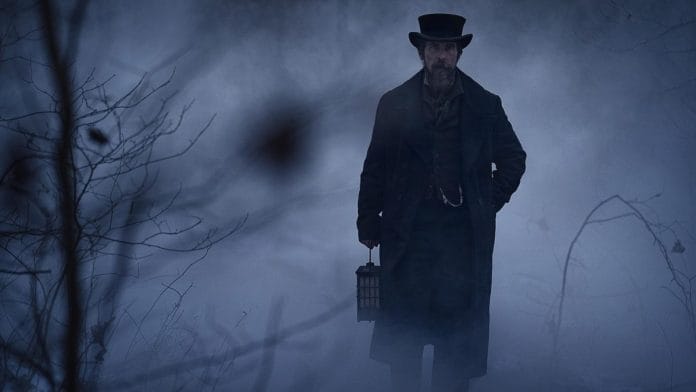The Pale Blue Eye, based on a book of the same name by Louis Bayard, is a gothic mystery with Christian Bale playing a veteran detective and Harry Melling as young cadet Edgar Allen Poe. This pitch should intrigue an average cinephile and literature geek to hop on to Netflix but sadly, the charm ends right at this spiel.
Set in 1830, the historical noir is picturised on the backdrop of wintry New York’s Hudson Highlands. After an alleged suicide of a cadet at West Point Military Academy, the heart is carved out from the body signalling a much crueler plan at play. Hence, the ace detective Augustus Landor (Bale) is summoned.
Directed by Scott Cooper, whose three of six directorial ventures have starred Bale, has managed to create a well-cast mystery in The Pale Blue Eye, which is intriguing but lacks the piercing gaze for a crime thriller. The story holds together exceptionally as a gothic piece of horror right up to the climax, when it falls prey to its own over-calculated screenplay. By the time you reach the end, you are left questioning your loyalty to the central characters, who don’t leave a lasting impression but rather make you question their prominence to the plot in the first place.
Perhaps, Cooper is a better director than a writer.
Melling outshines Bale
It is understandably natural to expect Bale to be the highlight of any project he headlines. However, the case is slightly different in The Pale Blue Eye.
The one actor and even the character that shines through is Melling.
For the uninitiated, Melling also played Dudley Dursley in Harry Potter films. From the spoiled Dudley in the wizarding world, Melling has transformed into a suave, death-obsessed poet, Edgar Allan Poe — a fictional interpretation of the celebrated American writer-poet.
As the film progresses, Poe quickly evolves to be the Watson to Landor’s Sherlock. In one scene, Poe, with much enthusiasm, decodes a riddle presented by Landor. The latter sits across the table with a gracious smile, watching the former revel in his own discovery. That is, perhaps, the apt representation of how the veteran actor must feel seeing the younger one outshine him.
This is not to say that Bale has not acted well. He could have played this role in his sleep. It just happens to be Melling’s film, more than Bale’s.
Among the supporting cast, there is Toby Jones and Gillian Anderson — the two highly revered actors who seem to be no more than props in Cooper’s gothic mystery world.
After a notorious and playful Benoit Blanc, Netflix’s new detective Augustus Landor, a grieving former policeman, is not as memorable. The Pale Blue Eye is brimming with potential, which nosedives in the last ten minutes.
(Edited by Prashant)






